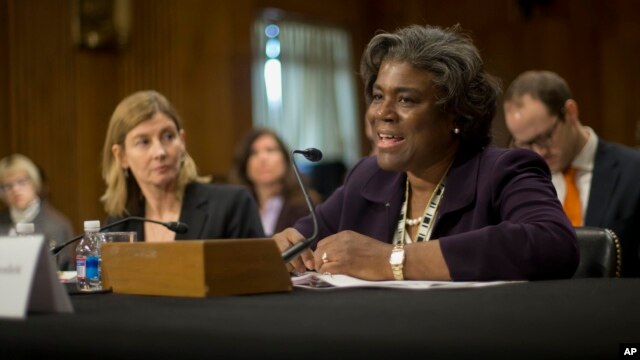
U.S. Assistant Secretary of State for African Affairs Linda Thomas-Greenfield, right, accompanied by USAID Assistant Administrator for Bureau for Democracy Conflict and Humanitarian Assistance Nancy Lindborg, testifies on Capitol Hill, Jan. 9, 2014, before the Senate Foreign Relations Committee hearing on situation in South Sudan.
WHITE HOUSE — The White House Friday declined to confirm a report that the United States is considering imposing targeted sanctions against the government of South Sudan. Washington, however, continues to evaluate ways it can maintain pressure on warring South Sudan parties to bring an end to fighting.
White House spokesman Jay Carney was asked by VOA about a Reuters news report from the United Nations that the United States is weighing imposing targeted sanctions in a move to increase pressure on warring parties. Reuters quoted what it called a source briefed on U.S. discussions. Reuters said this was confirmed by another source, but both provided no details on precise measures being considered.
Carney said he could not respond to the Reuters report. But Jonathan Lalley, Assistant Press Secretary for National Security, said the U.S. is "continually evaluating what more we might do to keep up the pressure on the parties to make progress on negotiations."
On Thursday, National Security Adviser Susan Rice had issued one of the strongest statements yet, aside from President Barack Obama's appeal last month about fighting in South Sudan.
She urged both sides in the conflict to sign an agreement to cease hostilities immediately and voiced disappointment that South Sudan's government had not released detainees.
Jay Carney declined to respond to another question about whether the U.S. continues to have confidence in President Salva Kiir.
Carney, however, emphasized ongoing U.S. concern about the situation in South Sudan.
"I think we are all, from the president on down, concerned about the violence there and instability that it creates," he said.
In a Senate Foreign Relations Committee hearing Thursday, witnesses suggested use of targeted sanctions as a way of exerting pressure for an end to violence.
"You can collect the evidence and use that evidence immediately to impose targeted sanctions against individuals who are found to be perpetrating and suspected of perpetrating mass atrocities, and leading these kinds of things," said John Prendergast, a former U.S. State Department official.
Other options for targeted sanctions include such steps as banning travel by officials and freezing assets.
South Sudanese government troops said they recaptured the town of Bentiu in oil-producing Unity state, after a battle with rebel forces loyal to former vice president Riek Machar.
Delegations representing both sides were sent to Addis Ababa, Ethiopia for peace talks, but have not yielded results.
In testimony to Congress, Assistant Secretary of State for African Affairs Linda Thomas-Greenfield blamed what she called a huge political rift in the governing Sudan People's Liberation Movement (SPLM), rather than a coup attempt, for the fighting.
The United States, along with countries that neighbor South Sudan, are concerned about the humanitarian repercussions of fighting, which according to the United Nations, has displaced more than 200,000 people.

Three children walk through a spontaneous camp for internally displaced persons at the United Nations Mission to South Sudan (UNMISS) base in Juba, Jan. 9, 2014.

No comments:
Post a Comment